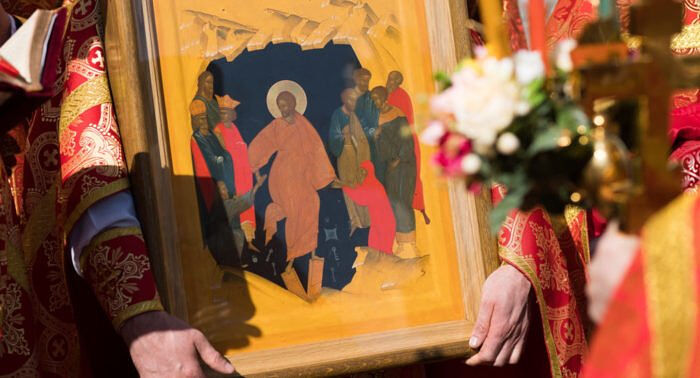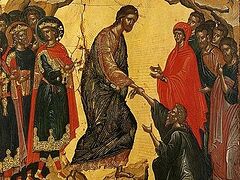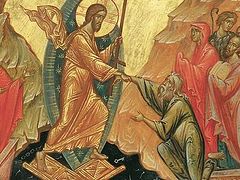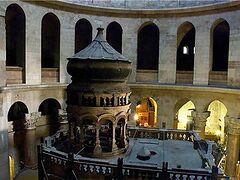Christ is Risen! Indeed He is Risen! Beloved, we greet each other with the festal proclamation of Christ’s Resurrection for the final time until the following Pascha of 2022. Today, we observe the Απόδοσις of Pascha. This is translated in English as the “Leave-Taking” of Pascha. This occurs today, the Wednesday before the Feast of the Lord’s Glorious Ascension. Απόδοσις is translated as “Leave-Taking” yet this translation does not serve due justice in my opinion; Απόδοσις means to “give back”.1 Pascha is the epitome of feasts, it is the Feast of Feasts and the Festival of Festivals, as we hear chanted in the Paschal Canon. And in the same Canon we hear that Pascha is an eternal feast—they went forth with joy keeping an eternal Pascha. And each Feast certainly has the eternal, cosmic dimension: For example, we will live the mystery of Christ’s Theophany and Transfiguration in the world to come since God is revealed to us as much as we can bare. Those feasts may initiate us into aspects of what we will experience, yet our future condition can properly be described by one word: Pascha. Now, I speak of the eternal, ethereal dimension of the Paschal Feast. The earthly dimension of the Feast is that it occurs in time and space—one might say it is annually incarnated—at a specific moment. This is also the liturgical aspect of the Feast. The Feast in its worldly dimension occurs on a specific date and is celebrated for a number of days. Pascha is celebrated for thirty nine days to be exact—today is the last day of the Paschal celebrations. Therefore, today we “give up” the Feast in its worldly dimension. And despite this, we continue to live Pascha in the mystical sense, in the other-worldly sense, for each Liturgy is a festal celebration and commemoration of the Cross, the Tomb, the Resurrection on the Third-Day. Each Liturgy is a Pascha wherein we commune of the Resurrected Lord’s Precious Body and Blood. Each Liturgy is eternal; we live the Lord’s Passion, Crucifixion, Burial and Resurrection; we commemorate His entire Life, we live Him and behold Him as He is; in each Liturgy the Lord manifests the eternal Pascha to us, mortal men.
At each Liturgy we give back to the Lord the very gifts that He vouchsafed us to offer to Him. We give to the Lord nothing more than what is His own. We gathered in churches, which we meticulously prepared for the Paschal night. We cleaned them to the best of our ability, we placed the best of what we have in them: the best covers for the altar, the best chalice sets, the best vestments for the priests, the cleanest candles. And we chanted to the best of our ability the Paschal hymns appointed for the Paschal night. We prepared festal eggs and festal breads and festal baskets. We laid out festal tables on the Paschal day; we celebrated with those whom we hold dearest. Finally, with the highest quality of spiritual labor and toil, as much as each could prepare himself or herself, we partook of the Heavenly Mysteries in the Holy Eucharist: In everything, we offered not so much something that is our own, for essentially nothing is our own. Our strength is not our own, our health is not our own, our happiness is not our own, our family is not our own, our lives are not our own. It is in Him that we breath, we move, we have our being. Every good gift comes from above, from Him, the Father of Lights and Thine own of Thine own we offer unto Thee. The Lord offered to us the Feast of Pascha, for He Himself became our Pascha. It is through His sufferings, through His Passion and Crucifixion and Burial, and Descent into Hades, and finally, through His Third-Day glorious Resurrection that we are redeemed as a Holy Nation, a Royal Priesthood.
We are redeemed communally in the Resurrection, for we celebrate Pascha communally. And just as death is the common fate of all men, they have a loftier fate that awaits them after death. Some will resurrect to a resurrection of life, and others to a resurrection of judgement. Often during the Paschal season we sang: Having beheld the Resurrection of Christ, let us worship the Holy Lord Jesus, the only sinless One. The question is obviously asked: how have we beheld the Resurrection? Today, we “give up” the Paschal Feast, yet how is it possible to actually give up something that has had such a profound impact on you, something that you have intimately beheld? We beheld the Resurrection in spirit, in the element of the eternal nature of the Paschal Feast, which deeply affects each one on the Paschal night. We beheld the Resurrection when we greeted each other with the festal greeting and we cracked the red Paschal eggs, and we exchanged the Paschal kiss of love. We beheld the Truth of Christ, His victory over death in the glorious Resurrection, and our own immortality bestowed by Christ when we looked into each other’s eyes and exclaimed Christ is Risen! Here, we were not overcome by a worldly feeling of joy or some fleeting inspiration from a beautiful Paschal service, after which we returned to the life we lived prior. Such emotions are of this world. Those who hold the mystery of Pascha in the depths of their hearts, those who have truly beheld Christ’s Resurrection, are marked forever by the divine ramifications of the Feast. They live the Feast of Pascha daily throughout the year. In this regard, they participate in the mystery of the Age to Come, for they live that Age in time and within the worldly matter.
Such men and women are known as saints. The Feast of Pascha calls us to sanctify. Pascha provokes us: Pascha provokes us to transfiguration and repentance, which result in newness of life. We are called to come to the new fruit of the vine on the all-radiant and auspicious day of the Resurrection. We are called by this going-forth from death to life, by this procession of repentance and transfiguration and change to make a journey on the Paschal night to the Kingdom of Christ wherein we praise Him as the Living-God. Pascha is a journey. The Israelites experienced their Exodus and Pascha as such a journey from the death of Egypt to the life of the Promised Land. And we as the Holy people of God now rejoice in the fulfillment of these symbols. For Christ, who is the Paschal Lamb slain and offered for our redemption, has become Himself a ransom to death. And now we experience death’s bitterness momentarily. And if we have lived a well-lived life in Christ, we go to be with Him. We suffer with Him, and we certainly will rise with Him. Pascha is our cosmic experience as the Church and the world. And yet each one will experience his or her own Pascha. Pascha is the end of the journey and likewise the beginning. Pascha has an eternal dimension, and the worldy dimension is but an icon into the eternal character of the Mystery. Today, we seemingly give it back to the Lord; the festal greetings of Christ is Risen, Indeed He is Risen cease until the following Pascha. The Paschal Troparion, Christ is Risen from the dead trampling down death by death and upon those in the tombs bestowing life, will no longer be chanted until the following Pascha. Yet now, as we say these words for the final time, let us bury them as a treasure in the heart. Let us live each Sunday as a small Pascha, that evidence of the Resurrection might be manifest to the world. Until we meet the glorious Feast of Pascha again, let us cry with the entirety of our mind and heart: Christ is Risen! Indeed He is Risen!




